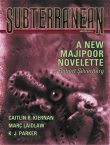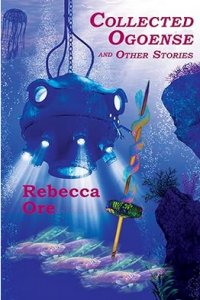Lois Tilton reviews Short Fiction, mid-January
The new publishing year comes with an alteration of the schedules of some of the zines, which means an alteration of my reviewing schedule. Unfortunately, I still can’t always get publishers to send me stuff when I have time to read it. This mid-month report is accordingly short.
The good-story award this time goes to Subterranean; my favorite is the Laidlaw.
Publications Reviewed
- Subterranean, Winter 2011
- Strange Horizons, January 2011
- Lightspeed, January 2011
Subterranean, Winter 2011
The first stories posted in the year’s first quarterly issue are all relatively short for this publication. As the website suggests, these first two are notable for their unexpected endings.
I always find it frustrating that Subterranean doesn’t list a full table of contents when it begins a new quarter. The names on the cover include Laidlaw and Kiernan, along with K J Parker and Silverberg, and the notice on the website adds that there will be at some point a story by Niven. What other stories will appear later remains unknown to me.
“A Long Walk Home” by Jay Lake
Another story in Lake’s series about the Howard immortals, a group of people artificially altered for extreme long life in extreme circumstances, with an extreme tolerance to isolation. Aeschylus Sforza is exploring the tunnels beneath a world named Redghost when his sensors register vibration and a rise in radiation on the surface. Emerging, he discovers that his vehicle has been attacked and destroyed, probably from orbit. He now has to walk back to civilization, if there it has survived whatever has happened. Which it hasn’t. Ask’s tolerance for isolation is going to be tested.
But since he had not seen a single contrail or overflight in the past two weeks, he wasn’t optimistic there, either. The night sky, by contrast, had been something of a light show. Either Redghost was experiencing an extended and unforecasted meteor shower or lot of space junk was de-orbiting.
This story is two things: a psychological portrait of an individual totally alone, and a mystery. Along with Ask, we want to know: what happened on Redghost? What happened to the missing people? Who did it? How did they do it? Did it have anything to do with the strange deposits in the tunnels? How many other worlds were attacked? Are there any other humans surviving anywhere in the universe? The psychological portrait is effectively done, with a hint of dark humor throughout the telling. It is a story of survival that only an effective immortal could endure, and we also see the humane side of Ask’s character as he carefully checks the abandoned buildings for trapped animals. As for the mystery — if this were a hardcover book, it would have left a dent in my wall. Curse you, Jay Lake!
“The Boy Who Followed Lovecraft” by Marc Laidlaw
Orphaned Douglas finds solace in his lonely existence by reading magazines like Weird Tales, of which his aunts do not approve.
“Nightmares, trash and madness,” they had called the tales; and that word alone had ensured his disobedience, for it was madness he sought to understand. Madness was the reason he lived here, after all; it was the reason the old women had brought him in as a foster child: “A kind of madness took them,” was all they ever said when he asked about his parents.
Then he discovers that his favorite author happens to be a close neighbor. The hero-smitten Douglas follows the man he believes to be Lovecraft, hoping for a chance to speak to him.
A shocking, unexpected conclusion, one of the rare endings that I truly do not want to reveal any further. Douglas is a highly familiar, sympathetic character, a “good boy,” as his aunts have raised to be, but compelled to keep the guilty secret of his magazines hidden. I don’t recognize him as a figure from our history, but he is definitely one of us.
–RECOMMENDED
“The Melusine (1898)” by Caitlín R Kiernan
The traveling show arrives at midday, as if to spite the high white eye of the summer sun glinting off tin roofs and factory windows and the acetate-aluminum envelopes of the zeppelins moored at Arapahoe Station. “Only mad dogs and Englishmen,” as the saying goes, but apparently also this rattling, clanking hullabaloo of steam organs and barkers and pounding bass drums.
At which, readers will flip on their steampunk reading protocols, for in addition to the zeppelins, there are brass and clockwork automatons, with which the show’s spectators are familiar. An unlikely spectator is the practical and skeptical Miss Cala Weatherall, spinster engineer whose life is one “of math and precision, of slide rules and difference engines,” but who has had a portentous dream of a wondrous traveling show.
In the story, “the air thrums and crackles, transformed, as if by the sizzling tendrils of an electrical storm.” Likewise, the prose is energized and luxuriant, the most notable feature of the piece. A number of critics are becoming impatient with the misuse of steampunk tropes and clichés. Although the zeppelins here are only window-dressing, this is a story that could only work in a milieu where mechanical automatons are present, and the protagonist fits perfectly into the setting.
Strange Horizons, January 2011
This ezine will now only be posting original fiction the first three weeks of the month.
“Source Decay” by Charlie Jane Anders
An episode of a fake reality show attains video immortality and undergoes alterations as human society alters in various ways through the centuries. The premise has been done before, and the humor is labored.
“The Space Between Stars” by Cassandra Clarke
The narrator works at a secret base, perhaps Area 51 in Nevada. Before the alien invasion he was allowed to spend weekends in Las Vegas, where he had an ongoing asexual affair with a showgirl. The 2nd person narrative is addressed to her in the narrator’s imagination as he reminisces about their past together.
You sat down on the couch and glitter puffed up like a cloud around you, catching in the suite’s track lighting. I smiled. You said, “That’s the problem with me. Glitter everywhere, four nights a week.”
There is surprisingly little emotional resonance in this piece of nostalgia about a man whose chances for a real personal life have been thwarted by the secrecy required by his job, now with nothing to show for it.
“Pinion” by Stellan Thorne
Greyling is an aging cop who has lost his longtime partner. All he has left is a smoldering anger. He goes through the motions of his job, holding it under control.
With slow clarity Greyling saw himself grabbing the clerk by his collar, dragging him across the counter, breaking his nose. There was no joy in the fantasy; it was like a worn film reel, looping methodically inside his head. He turned away, crumpling the sketch in his hand.
Then he has to arrest an angel, guardian type.
Nice prose in this very short piece paints the character with sharp strokes so that we feel the edge of his bitterness and despair.
–RECOMMENDED
Lightspeed, January 2011
This month’s stories fail with me, although I never thought I would say that about a piece from Tanith Lee.
“Postings from an Amorous Tomorrow” by Corey Mariani
In a world dedicated to empathy, young children have their brains augmented so they can network with millions of others simultaneously and love them. This is supposed to prevent war and other nastiness. The young narrator is particularly empathetic and happy with her world. Then the adults discover a boy who doesn’t seem to love himself, decide he is an incipient dictator, and set the children on him.
There was nothing the people of France could do about the dictator because their empathy training made it impossible for them to hurt another person. The training was glued in their brains and they couldn’t get it out because they were too old and their brains were too set.
A ridiculous story, told in that faux-simplicity tone that authors use for child protagonists. The premise is without credibility and contrived for maximum emotional manipulation, which is the usual reason authors use child protagonists.
“Black Fire” by Tanith Lee
Various witnesses report sighting a phenomenon, a UFO, a strange encounter. For all their different reactions, the reports are quite consistent on the basic facts: a fireball descending to earth.
I mean, it was so big and blazing bright — and yet so dark. I didn’t know you could have fire like that, black fire — it must be a phenomenon associated with certain types of extra-terrestrial objects.
And associated with the fireball, a transformational visitation to the female witnesses.
The narrative is in the form of testimony from a series of witnesses, identified only in code: either Witness A or Witness E, followed by an identifying number. The events they describe are similar, but details vary. This provides an intriguing puzzle for the reader, and I was working happily on figuring it all out when, about 2/3 of the way through, the author stopped and explained the whole thing, ruining all the fun and making the allusions seem way too obvious.







Pingback:Tweets that mention Locus Online Reviews » Lois Tilton reviews Short Fiction, mid-January -- Topsy.com